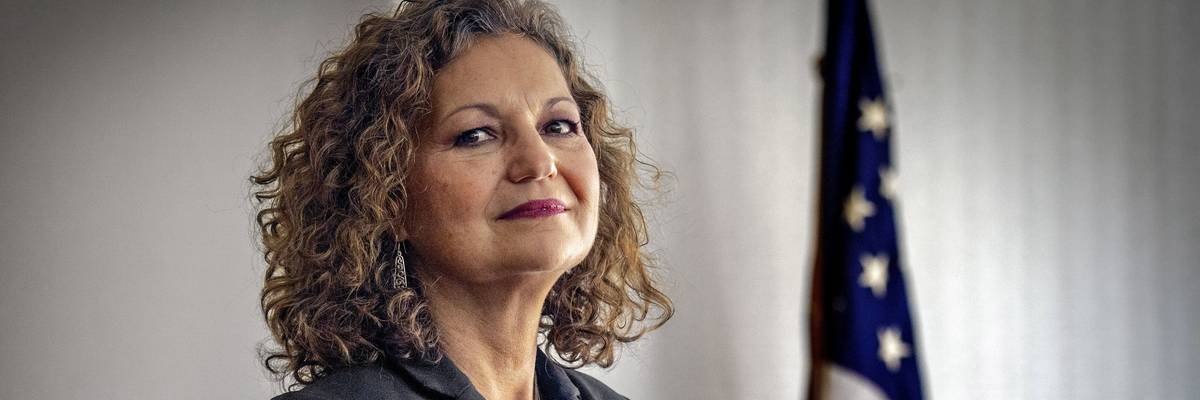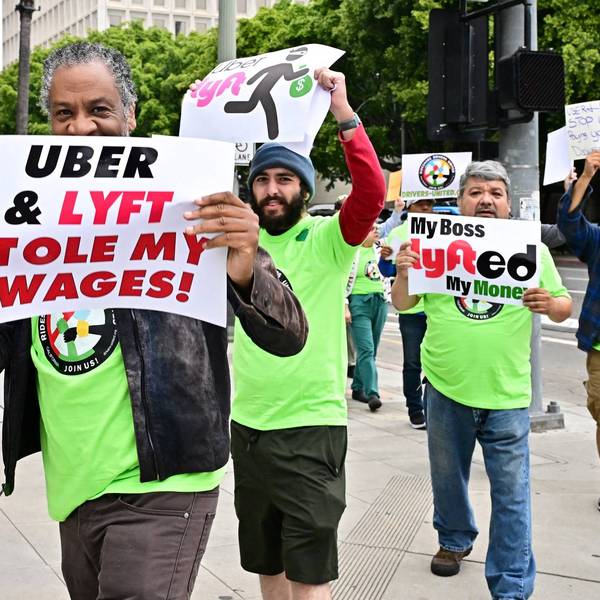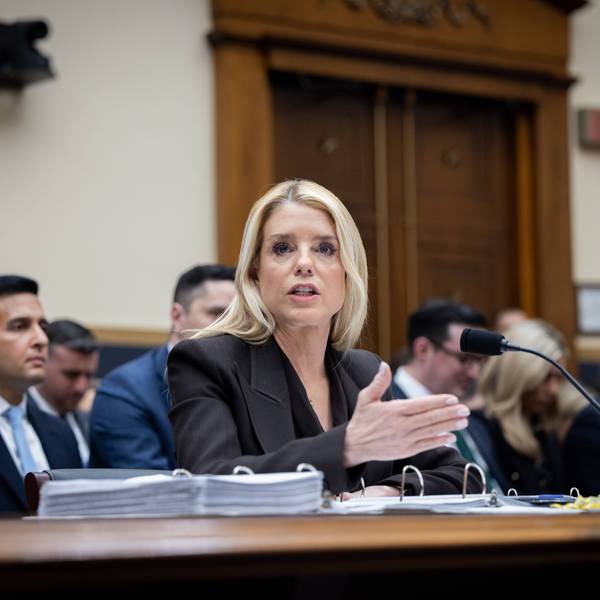
Jennifer Abruzzo, general counsel of the National Labor Relations Board, is seen in Washington, D.C. on September 20, 2022.
NLRB Head Says Corporate Union-Busters Want to Distract Public With Legal Challenges
"These esoteric arguments came about why?" said National Labor Relations Board Chief Counsel Jennifer Abruzzo. "Because we dared to issue a complaint against SpaceX after it unlawfully fired eight workers."
Amid an ongoing nationwide surge in union organizing across numerous industries in the U.S., powerful corporations in recent months have argued the federal watchdog tasked with ensuring fair labor practices is, itself, unconstitutional—but the nation's top labor lawyer said Tuesday she doesn't buy the claims of Amazon, Trader Joe's, and other companies.
The "deep-pocketed, low-road employers want to divert [the National Labor Relations Board's] sparse resources to defending ourselves in court," NLRB General Counsel Jennifer Abruzzo said at a virtual event, "to slow down or prevent us from engaging in concerted action. They're just trying to stop our enforcement actions."
Abruzzo spoke at a webinar titled "Preserving the Administrative State: Threats to Administrative Law Enforcement in the Courts," hosted by the left-leaning think tank Roosevelt Institute.
Watch the event below:
The event was held just over three months after SpaceX, billionaire enterpreneur Elon Musk's space exploration company, filed a complaint against the NLRB after the board accused it of unlawfully firing eight employees. SpaceX claimed that a "constitutionally required degree of control is lacking" at the agency because its judges and five board members cannot immediately be dismissed by a president.
In moves Abruzzo on Tuesday called "jumping on the bandwagon," an attorney for Trader Joe's argued at a hearing weeks later that the "structure and organization" of the NLRB is unconstitutional, and Amazon made a similar claim in February. Starbucks said in its own legal filing that the limitation on removing NLRB judges and members "frustrates the presidential control Article II [of the U.S. Constitution] demands."
"These esoteric arguments came about why?" said Abruzzo. "Because we dared to issue a complaint against SpaceX after it unlawfully fired eight workers for speaking about their workplace concerns. And then Amazon jumps on the bandwagon, Starbucks jumps on the bandwagon, Trader Joe's, others get in on the action just because we're trying to hold them accountable for repeatedly violating workers rights to organize and collectively bargain through representatives of their free choosing."
All the companies have been accused by the board's prosecutors of violating labor law—a fact that Abruzzo said the corporations are eager for the public to forget.
A key goal of the legal filings is to "to divert attention away from the fact that they are actually lawbreakers who need to be held accountable in a timely manner," Abruzzo said at the Roosevelt Institute webinar. "And frankly, that strategy is working. There's a lot of public reporting about the challenges as opposed to the law-breaking."
In addition to SpaceX's alleged illegal firing of workers, the companies have been accused of retaliating against employees, limiting workers' access to a warehouse, and closing store locations to discourage union activity, among other violations.
NLRB judges have already ruled against Starbucks, Amazon, and Trader Joe's in several workers' rights cases.
Two of the companies—SpaceX and Amazon—were founded by the two richest men in the United States, Musk and Jeff Bezos.
"Once billionaires are scared of the power of the NLRB, they bring in the big guns," Diana Reddy, a labor law professor at the University of California, Berkeley School of Law, said at the Roosevelt Institute event.
Abruzzo said courts are likely to reject the companies' claims, noting the U.S. Supreme Court upheld the organizational structure of the NLRB in 1937.
Other federal agencies, including the Consumer Financial Protection Bureau and the Securities and Exchange Commission, have also been challenged as unconstitutional by corporate interests. Rulings in those cases are expecting in the coming months.
An Urgent Message From Our Co-Founder
Dear Common Dreams reader, The U.S. is on a fast track to authoritarianism like nothing I've ever seen. Meanwhile, corporate news outlets are utterly capitulating to Trump, twisting their coverage to avoid drawing his ire while lining up to stuff cash in his pockets. That's why I believe that Common Dreams is doing the best and most consequential reporting that we've ever done. Our small but mighty team is a progressive reporting powerhouse, covering the news every day that the corporate media never will. Our mission has always been simple: To inform. To inspire. And to ignite change for the common good. Now here's the key piece that I want all our readers to understand: None of this would be possible without your financial support. That's not just some fundraising cliche. It's the absolute and literal truth. We don't accept corporate advertising and never will. We don't have a paywall because we don't think people should be blocked from critical news based on their ability to pay. Everything we do is funded by the donations of readers like you. Will you donate now to help power the nonprofit, independent reporting of Common Dreams? Thank you for being a vital member of our community. Together, we can keep independent journalism alive when it’s needed most. - Craig Brown, Co-founder |
Amid an ongoing nationwide surge in union organizing across numerous industries in the U.S., powerful corporations in recent months have argued the federal watchdog tasked with ensuring fair labor practices is, itself, unconstitutional—but the nation's top labor lawyer said Tuesday she doesn't buy the claims of Amazon, Trader Joe's, and other companies.
The "deep-pocketed, low-road employers want to divert [the National Labor Relations Board's] sparse resources to defending ourselves in court," NLRB General Counsel Jennifer Abruzzo said at a virtual event, "to slow down or prevent us from engaging in concerted action. They're just trying to stop our enforcement actions."
Abruzzo spoke at a webinar titled "Preserving the Administrative State: Threats to Administrative Law Enforcement in the Courts," hosted by the left-leaning think tank Roosevelt Institute.
Watch the event below:
The event was held just over three months after SpaceX, billionaire enterpreneur Elon Musk's space exploration company, filed a complaint against the NLRB after the board accused it of unlawfully firing eight employees. SpaceX claimed that a "constitutionally required degree of control is lacking" at the agency because its judges and five board members cannot immediately be dismissed by a president.
In moves Abruzzo on Tuesday called "jumping on the bandwagon," an attorney for Trader Joe's argued at a hearing weeks later that the "structure and organization" of the NLRB is unconstitutional, and Amazon made a similar claim in February. Starbucks said in its own legal filing that the limitation on removing NLRB judges and members "frustrates the presidential control Article II [of the U.S. Constitution] demands."
"These esoteric arguments came about why?" said Abruzzo. "Because we dared to issue a complaint against SpaceX after it unlawfully fired eight workers for speaking about their workplace concerns. And then Amazon jumps on the bandwagon, Starbucks jumps on the bandwagon, Trader Joe's, others get in on the action just because we're trying to hold them accountable for repeatedly violating workers rights to organize and collectively bargain through representatives of their free choosing."
All the companies have been accused by the board's prosecutors of violating labor law—a fact that Abruzzo said the corporations are eager for the public to forget.
A key goal of the legal filings is to "to divert attention away from the fact that they are actually lawbreakers who need to be held accountable in a timely manner," Abruzzo said at the Roosevelt Institute webinar. "And frankly, that strategy is working. There's a lot of public reporting about the challenges as opposed to the law-breaking."
In addition to SpaceX's alleged illegal firing of workers, the companies have been accused of retaliating against employees, limiting workers' access to a warehouse, and closing store locations to discourage union activity, among other violations.
NLRB judges have already ruled against Starbucks, Amazon, and Trader Joe's in several workers' rights cases.
Two of the companies—SpaceX and Amazon—were founded by the two richest men in the United States, Musk and Jeff Bezos.
"Once billionaires are scared of the power of the NLRB, they bring in the big guns," Diana Reddy, a labor law professor at the University of California, Berkeley School of Law, said at the Roosevelt Institute event.
Abruzzo said courts are likely to reject the companies' claims, noting the U.S. Supreme Court upheld the organizational structure of the NLRB in 1937.
Other federal agencies, including the Consumer Financial Protection Bureau and the Securities and Exchange Commission, have also been challenged as unconstitutional by corporate interests. Rulings in those cases are expecting in the coming months.
- NLRB Accuses Amazon of Unlawfully Calling Cops on Workers During Assault on Union Effort ›
- 'A Big Deal': New NLRB Joint-Employer Rule Will Close Workers' Rights Loophole ›
- In 'Direct Attack' on Labor Movement, Amazon Backs Claim NLRB Is Unconstitutional ›
- Alarm as Trump Judge Sides With Company Claiming NLRB Is Unconstitutional | Common Dreams ›
Amid an ongoing nationwide surge in union organizing across numerous industries in the U.S., powerful corporations in recent months have argued the federal watchdog tasked with ensuring fair labor practices is, itself, unconstitutional—but the nation's top labor lawyer said Tuesday she doesn't buy the claims of Amazon, Trader Joe's, and other companies.
The "deep-pocketed, low-road employers want to divert [the National Labor Relations Board's] sparse resources to defending ourselves in court," NLRB General Counsel Jennifer Abruzzo said at a virtual event, "to slow down or prevent us from engaging in concerted action. They're just trying to stop our enforcement actions."
Abruzzo spoke at a webinar titled "Preserving the Administrative State: Threats to Administrative Law Enforcement in the Courts," hosted by the left-leaning think tank Roosevelt Institute.
Watch the event below:
The event was held just over three months after SpaceX, billionaire enterpreneur Elon Musk's space exploration company, filed a complaint against the NLRB after the board accused it of unlawfully firing eight employees. SpaceX claimed that a "constitutionally required degree of control is lacking" at the agency because its judges and five board members cannot immediately be dismissed by a president.
In moves Abruzzo on Tuesday called "jumping on the bandwagon," an attorney for Trader Joe's argued at a hearing weeks later that the "structure and organization" of the NLRB is unconstitutional, and Amazon made a similar claim in February. Starbucks said in its own legal filing that the limitation on removing NLRB judges and members "frustrates the presidential control Article II [of the U.S. Constitution] demands."
"These esoteric arguments came about why?" said Abruzzo. "Because we dared to issue a complaint against SpaceX after it unlawfully fired eight workers for speaking about their workplace concerns. And then Amazon jumps on the bandwagon, Starbucks jumps on the bandwagon, Trader Joe's, others get in on the action just because we're trying to hold them accountable for repeatedly violating workers rights to organize and collectively bargain through representatives of their free choosing."
All the companies have been accused by the board's prosecutors of violating labor law—a fact that Abruzzo said the corporations are eager for the public to forget.
A key goal of the legal filings is to "to divert attention away from the fact that they are actually lawbreakers who need to be held accountable in a timely manner," Abruzzo said at the Roosevelt Institute webinar. "And frankly, that strategy is working. There's a lot of public reporting about the challenges as opposed to the law-breaking."
In addition to SpaceX's alleged illegal firing of workers, the companies have been accused of retaliating against employees, limiting workers' access to a warehouse, and closing store locations to discourage union activity, among other violations.
NLRB judges have already ruled against Starbucks, Amazon, and Trader Joe's in several workers' rights cases.
Two of the companies—SpaceX and Amazon—were founded by the two richest men in the United States, Musk and Jeff Bezos.
"Once billionaires are scared of the power of the NLRB, they bring in the big guns," Diana Reddy, a labor law professor at the University of California, Berkeley School of Law, said at the Roosevelt Institute event.
Abruzzo said courts are likely to reject the companies' claims, noting the U.S. Supreme Court upheld the organizational structure of the NLRB in 1937.
Other federal agencies, including the Consumer Financial Protection Bureau and the Securities and Exchange Commission, have also been challenged as unconstitutional by corporate interests. Rulings in those cases are expecting in the coming months.
- NLRB Accuses Amazon of Unlawfully Calling Cops on Workers During Assault on Union Effort ›
- 'A Big Deal': New NLRB Joint-Employer Rule Will Close Workers' Rights Loophole ›
- In 'Direct Attack' on Labor Movement, Amazon Backs Claim NLRB Is Unconstitutional ›
- Alarm as Trump Judge Sides With Company Claiming NLRB Is Unconstitutional | Common Dreams ›

